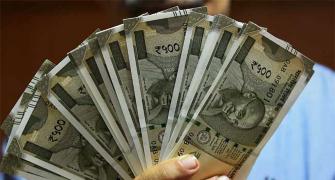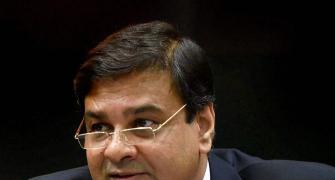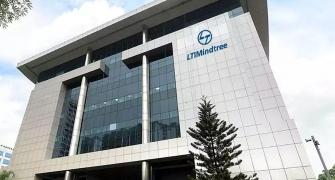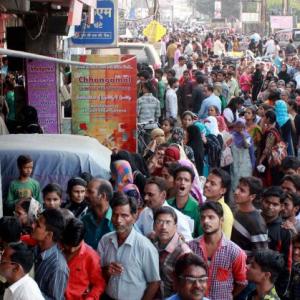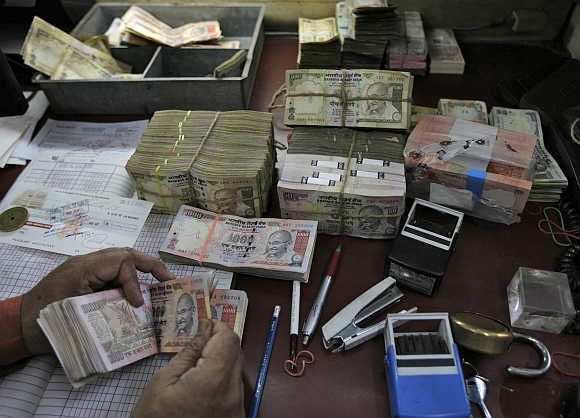 RBI on Monday conducted an unprecedented level of liquidity infusion to the tune of Rs 3.3 lakh crore, in which banks bid for as much as Rs 4.5 lakh crore. The central bank said it would conduct a liquidity infusion auction of Rs 1 lakh crore on Tuesday as well, to help banks tide over the liquidity crisis.
RBI on Monday conducted an unprecedented level of liquidity infusion to the tune of Rs 3.3 lakh crore, in which banks bid for as much as Rs 4.5 lakh crore. The central bank said it would conduct a liquidity infusion auction of Rs 1 lakh crore on Tuesday as well, to help banks tide over the liquidity crisis.
Upset by the Reserve Bank of India’s decision to charge the entire deposits that banks collected between September 16 and November 11 as a reserve requirement, bankers have said they would not be able to cut lending rates as much as was expected of them.
Banks would now be scrambling to manage enough liquidity for their healthy functioning even as the general public continues to pour in deposits of old high-value notes and the restriction of cash withdrawal prevents adequate outflow of the money deposited.
In a surprise announcement on Friday, RBI had said an incremental cash reserve ratio (CRR) of 100% would need to be maintained on deposits collected during the period mentioned above. Under normal circumstances, CRR is only 4% of deposits. Banks don’t earn any interest on CRR.
Sensing a liquidity shortage, RBI on Monday conducted an unprecedented level of liquidity infusion to the tune of Rs 3.3 lakh crore, in which banks bid for as much as Rs 4.5 lakh crore. The central bank said it would conduct a liquidity infusion auction of Rs 1 lakh crore on Tuesday as well, to help banks tide over the liquidity crisis.
The net effect is that instead of parking Rs 5 lakh crore at RBI under the reverse-repo window, banks are now rushing to borrow money from RBI.
Predictably, bond yields shot up on Monday. The 10-year bond yield closed at 6.32%, from its Friday’s close of 6.23%.
Banks had mobilised deposits of Rs 3.24 lakh crore between September 16 and November 11, which will cease to earn any interest for banks till RBI reviews the decision, which is likely on December 9. At the same time, banks will continue to pay interest on these deposits to their customers.
Analysts say it is a skewed negative carry-on cash and banks will be hard-pressed. State Bank of India chairman Arundhati Bhattacharya put it bluntly in an interview to a TV channel. “We do think the banks need to be compensated for this. I believe RBI is well cognisant of the fact.”
Talking to Business Standard, she clarified she had no specific mode of compensation in mind but would still expect the government or RBI to compensate some of the losses.
“It would have been good if our earnings were not hurt like this. I don’t have any specific compensation in mind, but let’s see if we get something from the government or RBI,” Bhattacharya said. However, she conceded that RBI might not have much of an option beyond CRR.
“They didn’t have the limit for market stabilisation scheme (MSS) and I am told cash management bills are for managing government liquidity mismatches. So, RBI probably did what was best available to them,” she said, adding the ability to cut rates sharply would be impacted by a hit in earnings.
Other bankers agreed with her assessment.
“It becomes somewhat difficult to pass on the benefits of lower cost of funds. It is expected to be a short-term situation, as RBI will revise the decision on December 9 or earlier,” said K P Nair, deputy managing director, IDBI Bank.
Interestingly, RBI will come out with its monetary policy review next week, two days before it revisits the CRR hike. Therefore, even if RBI cuts interest rates sharply, banks would unlikely be in a hurry to cut their lending rates.
Already, the Opposition parties have started pointing fingers at RBI’s inefficiency in implementing demonetisation. Market participants are also not much behind in their tone of criticism.
Jamal Mecklai, chief executive officer at Mecklai Financial, told Business Standard last week that the demonetisation exercise had shaved some credibility off RBI, and foreign investors wouldn’t take it kindly. “If I have to put my money in this scenario, I would have to be careful.”
Analysts and economists are unanimous in saying that interest rates will not come down in a hurry. “The imposition of this drastic control measure is because adequate collateral of government securities is not available at RBI window and, hence, this step of impounding all excess reserves at zero interest cost to RBI,” said SBI Group Chief Economist Soumya Kanti Ghosh.
According to him, the total CRR requirement for banks would shoot up to Rs 8 lakh crore, much more than what the banks were managing through deposits.
“Communication regarding forward guidance in terms of what constitutes ‘reactive policy’ based on market developments and decisions based on the medium-term outlook must be given by RBI,” wrote Ghosh in his paper.
“Banks could delay cutting their lending rates given that they have promised at least 3 to 4% interest rate to savings account depositors, but will not be receiving any interest on the deposits impounded for CRR,” said Dharmakirti Joshi, chief economist at CRISIL, adding: “RBI’s prognosis on downside to growth due to demonetisation will be the key factor driving repo rate decision on December 6-7.”
RBI Governor Urjit Patel told news agency PTI in an interview that the decision will be revised once the government issues adequate quantum of bonds under the MSS. Later, talking to reporters, Economic Affairs Secretary Shaktikanta Das said the government was reviewing the proposal from RBI about increasing the MSS ceiling from the present Rs 30,000 crore.
Bank of America Merrill Lynch (BofA-ML) expect the RBI to cut rates by 25 basis points in its December 6-7 policy and 50 basis points by April 2017. The deposit accretion and black money conversion “should allow banks to cut lending rates even in October-March busy industrial season,” said Indranil Sen Gupta, India economist of BofA-ML. The rate cuts would be necessitated as demonetisation would likely hurt economic growth, he added.


